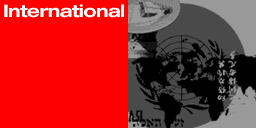Martin Woollacott
Tuesday April 11, 2000
Recalling his days as a correspondent on the Northern side during the Korean war, the Hungarian writer Tibor Meray spoke about travelling through a landscape so devastated by US bombing that cities had become no more than collections of chimneys. "I don't know why houses collapsed and chimneys did not," he told Thames television, "but I went through a city of 200,000 inhabitants and I saw thousands of chimneys and that - that was all."
Without some such image it is difficult to understand the Koreas. Both were traumatised by the war, and both have been embattled, in some sense, ever since. But while South Korea has found a relatively secure place in the world, thanks to American and Japanese support and to its own economic success, North Korea has never escaped from the sense of vulnerability captured by Meray.
Both states have feared one another - and one another's allies - but it is arguable that the North has been more fearful than the South.
The summit planned for June between Kim Dae-jung and Kim Jong-il represents an easing of these Northern anxieties precisely because it is a step away from the unification, which both sides theoretically proclaim as an aim, rather than a step towards it.
Despite the fact that some of the politicians involved bear titles which include the word "reunification", and in spite of the rhetoric on both sides, good relations between the Koreas depend on postponing unification to the distant future. This has been the difficult lesson of the 90s.
The uninformed expectation that North Korea would be more or less peacefully folded into the south in the manner that East Germany joined West Germany - or that it would collapse and be taken over - caused an increase in tension that could have led to war, particularly in 1994. It probably also pushed on the North Korean nuclear weapons and missile efforts which were the main cause of the military tension.
After 1989 the idea that Korea would be unified on the German model was examined. The South Koreans were unenthusiastic only because findings suggested that incorporating the North would be hugely expensive. North Korea's leaders, by contrast, were enraged that people around the world were happily discussing the extinction of their regime.
The renunciation of the nuclear non-proliferation treaty in 1993 was a signal that their powerful sense of encirclement had become intense. The rest of the decade has been spent persuading the North Koreans that the US, South Korea, Japan, and their many allies, far from wishing North Korea dead and gone, are ready to help it survive and even prosper.
The former US president Jimmy Carter helped defuse the crisis of 1994 by creating the basis for an agreement to freeze North Korean civil nuclear development.
US efforts to reassure North Korea have continued, most recently with talks based on the recommendations of the former defence secretary William Perry. These led to a lifting of American sanctions and to a deal last year under which North Korea is to suspend missile development and conduct no more long range missile tests like the one in 1998..
The food crisis in North Korea, which began in 1995 and remains serious, brought into that closed society hundreds of foreign aid workers. A degree of trust has gradually been established. Kim Dae-jung, the former dissident who became president of South Korea in 1998, has pursued what he calls a "sunshine policy" which stresses helping North Korea.
The results of this emphasis on help by the United States, international agencies and South Korea have paid off this year in diplomatic contacts and negotiations with Japan, the Philippines, Italy, Australia and now between the two Koreas.
Kim Jong-il and the North Korean leadership actively sought this help because it was the only way their state could cope, but they remain suspicious of the deeper motives of those aiding them. But while swings between between trust and suspicion will continue to shape Korean relations, it is permissible to hope that the worst may be over.








